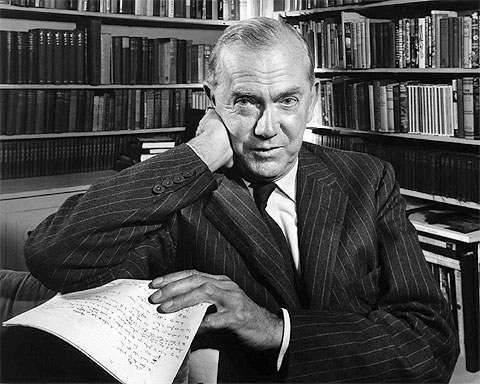Born at Berkhamstead, Hertfordshire, Greene was educated at Berkhamstead School, where his father was headmaster. He ran away from school and underwent psy choanalysis in London. He read English at Oxford, and graduated in 1925 — the year in which his only collection of poems, “Babbling April”, was published. He worked for a year as a reporter for the Nottingham Journal. It was at this time that he turned from the Anglicanism of his family to Roman Catholicism. He worked for four years (1926–30) as a subeditor with The Times. Soon after his first novel, “The Man Within”, was published in 1929, he left his job to free-lance as a book and film critic. His first
three novels are less highly regarded than his fourth and subsequent works. It was with “Stamboul Train” (1932) that he began to attract attention, particu larly when, two years later, it was the first of his many novels to be filmed. In 1935 he travelled in Liberia, West Africa, and returned to write about the experience in “Journey Without Maps” (1936). In 1938 he was commissioned by the Church to visit Mexico and report on the persecution of priests and believers there
by the military gov ernment. This trip was recorded in “The Lawless Roads” (1939) and provided him with inspiration for what is regarded by many as his finest novel, “The Power and the Glory” (1940). During the Second World War Greene worked for the Foreign Office
in Sierra Leone 1941–43). “The Heart of the Matter” (I948), his other “finest novel”, was a product of those years. Other novels, “entertainments”, short stories — “May We Borrow Your Husband” (1967) was the latest — and his autobiography, “A Sort of Life” (1971), followed in the post war years. His plays “The Living Room” (1952), “The Potting Shed” (1947) and “The Complaisant Lover” (1959) were published and performed. But these have not added substantially to
his literary reputation. He has been actively involved in the filming of his novels, in publishing, and in public affairs bearing upon censorship and authors’ rights. He was made a Companion of Honour (CH) in 1966.
THE QUIET AMERICAN
The novel is set in Vietnam during the French war against the Viet minh, and revolves around the death of Alden Pyle (the Quiet American), a naive and high-minded idealist who has arrived in the country as a member of the Economic Aid Mission, “ impregnably armoured by his good intentions and his ignorance”.
The narrator, Thomas Fowler, is a middle-aged English journalist, cynical and detached: “Not involved… It had been an article of my creed”. Estranged from his wife in England, Fowler lives with an Annamite girl, Phuong. The story alternates the period immedi ately after Pyle’s murder and the events leading to it. Vigot, the priestlike officer, appears after the event to investigate, and it is partly his presence which causes the narrator to reconstruct the past. Pyle
steals Phuong from Fowler, able to offer her the dream of mar riage and a home in America. He has also become involved in sub versive politics, and begins to direct funds to a small guerrilla army under the nationalist General Théin the mistaken belief that it will help the struggle against Communism. When Fowler learns, that the American has played a part in a bomb explosion in a local cafe, caus ing horrific injuries, he informs on Pyle, thereby promoting the latter’s murder.
His motives are hardly pure, however, for he is partly driven by jealousy over the loss of his mistress.
At the end of the novel Fowler has retrieved Phuong, and now finds himself in a position to marry her, but he is left wishing that “there existed someone to whom I could say that I was sorr”.
I. Answer the questions.
1. Where is the novel set?
2. What kind of man was Fowler?
3. Who does Fowler live with?
II. Translate these expressions.
1) наївний, благородний ідеаліст;
2) відновити минуле;
3) жахливі пошкодження;
4) стаття мого кредо;
5) повернути когось;
III. Make up sentences using the expressions above
